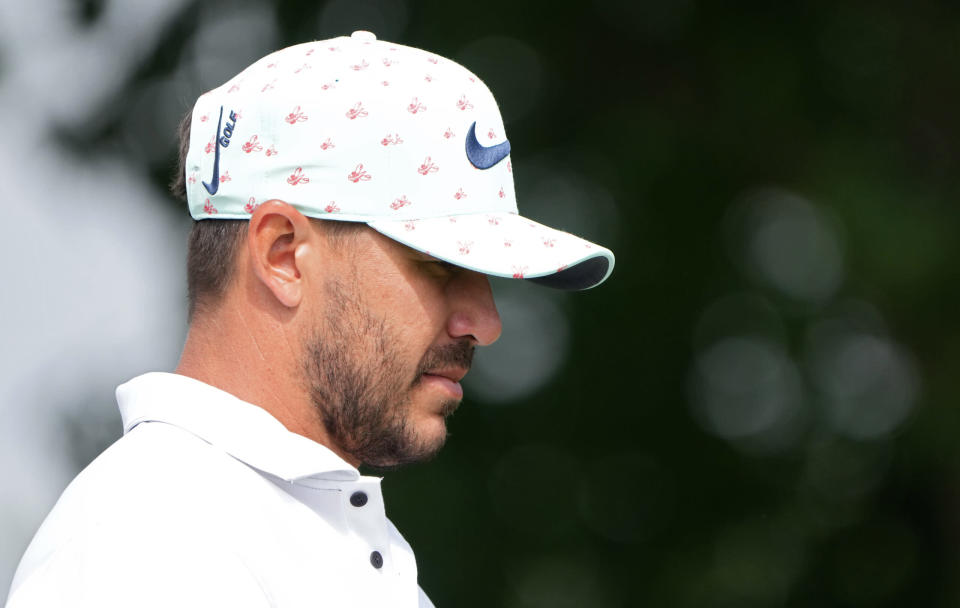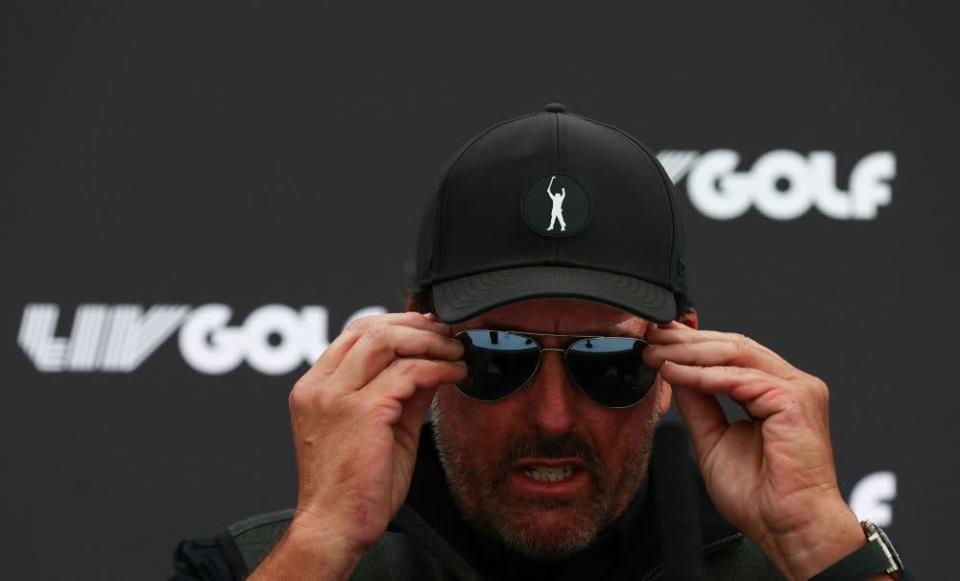
Somewhere over the last few days — since back when he was telling friends that he was emphatically out on the LIV Golf series — Brooks Koepka found a metaphorical horse’s head in his bed, an offer he couldn’t refuse from the Saudi dismemberment enthusiasts behind the breakaway circuit. Since Koepka does not suffer fools gladly and has been vocally contemptuous of LIV Golf’s leading figures — Greg Norman, Phil Mickelson and Golf Saudi CEO Majed Al Sorour — we must assume the offer was sufficiently high for him to sleep soundly.
For those who know Koepka well, one brief moment at last week’s U.S. Open offered early and irrefutable evidence that he had cast his lot with LIV Golf. He walked up to Mickelson on the range to offer him a fist bump and exchange a few words. That will not be the only time he finds himself doing something that would until very recently have found unpalatable. The Saudis expect loyalty among team members, whether golfers or murder squads in faraway consulates.
Beyond now having to labor at the beck and call of people he dislikes (with good reason, to be fair), the decision to join LIV Golf represents a humiliation for Koepka, though he will be loathe to admit it. He has always fancied himself more an athlete than a golfer, but this is an admission that he’s neither, that he’s just an entertainer doomed to play exhibitions against the washed-up veterans and no-name youngsters that he’s long considered unfit to sniff his jockstrap.
There’s a reason behind the tacit acknowledgment: Koepka’s body has been degrading for years and a nagging injury has him perilously close to surgery and a lengthy layoff. He might have committed to the Saudis, but they will be lucky to see him fulfill it.
There is a trend apparent among the players going to LIV Golf, beyond the obvious thirst for money. In almost every case, their long-term ability to consistently compete against the world’s best on the PGA Tour is questionable, be it on the basis of physical longevity (Koepka, DeChambeau), decrepitude (Mickelson, Westwood, Poulter), diminishing skill (McDowell, Kaymer) or apathy (Johnson, who’d rather be fishing). They are stars emeritus, their best-rendered roadkill some miles back by younger, healthier and more powerful competition. Any suggestion that he belongs among their ranks will wound a prideful man like Koepka, but it’s true.
Competitive relevancy is one of the most predictable aspects of this story, along with nominally reputable media galloping to the gate with thinly-sourced rumors, witlessly assisting the Saudis in creating a narrative that momentum has turned inexorably their way. There are other emerging trends worth noting too.
The buying of critical voices, for example. It goes back to Paul Casey. As a UNICEF ambassador, he sat out the first Saudi International tournament in 2019 as an act of conscience. By the following year, Casey had been compensated enough to explain his presence as an act of engagement. It continues today. Pat Perez publicly stiff-armed LIV Golf months ago — not least because of his well-known dislike of Mickelson — but he too was bought off.
And finally, Koepka, who had several terse exchanges with Saudi representatives when rejecting their advances in 2021. Eventually, they found his price too.
Another obvious trend is the heat map of player management agencies. Take GSE Worldwide, which has creamed off millions of dollars in fees for funneling its clients into the Saudi rat trap — DeChambeau, Abraham Ancer, Sergio Garcia, Louis Oosthuizen, Branden Grace, with plenty more of their assets among the rumored and imminent. And if you want evidence that Jay Monahan can’t catch a break: one GSE client who has not been offloaded to the Saudis is Grayson Murray.
The sentiment on the range at TPC River Highlands after Tuesday’s player meeting was mixed. There were expressions of support for Monahan and faith in the changes he’s proposing, even from journeymen who will have to scrap harder for their crust. But that was tempered with irritation that he hasn’t been out there in public slugging the Saudis often enough. That’s a criticism that cuts both ways. Monahan told players that they need to get off the fence and fight for their Tour, too.
The meeting had two sobering moments for some of the assembled players whose peripheral awareness is perhaps not what it should be. Monahan was asked who would pay the lawyers if and when the suspended Saudi-linked players or their benefactors litigate. You will, came the answer. The commissioner explained that the Tour is an association, a collective of members, and that a suit launched by one player against the Tour is a suit launched against (and defended by) every player.
He was also pressed on what steps are being taken by the major championships, each run by an organization Monahan doesn’t control. It’s a fraught question given the fear of legal exposure if the majors are perceived as helping the Tour shut out a competitor, but the answer was simple: nothing, for now. It was a reminder of the important role that will ultimately fall to the majors. One side wants them to act, the other relies upon them doing nothing. Players on both sides, however, insist the majors can’t put forth a credible field without their support.
Even before Monahan gathered his members Tuesday morning in Connecticut and asked them to make their voices heard, a small group of high-profile players were talking about making an unequivocal public and united stand against LIV Golf and in support of the PGA Tour.
Until this week, that group included Brooks Koepka.
List
How it started vs. how it’s going: Here’s what pro golfers said before about LIV Golf, and what they’re saying now


